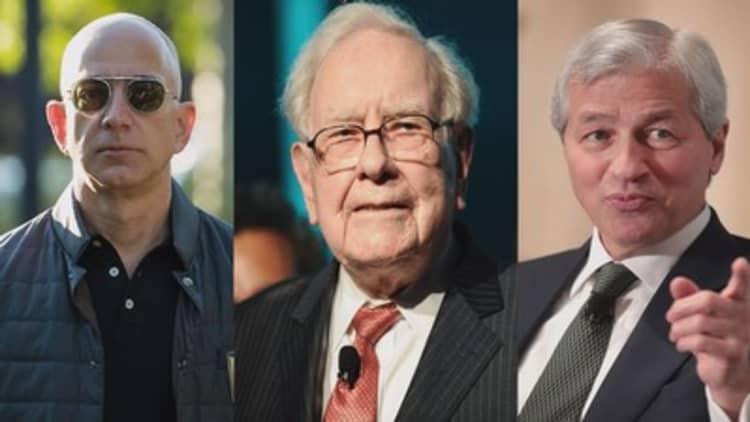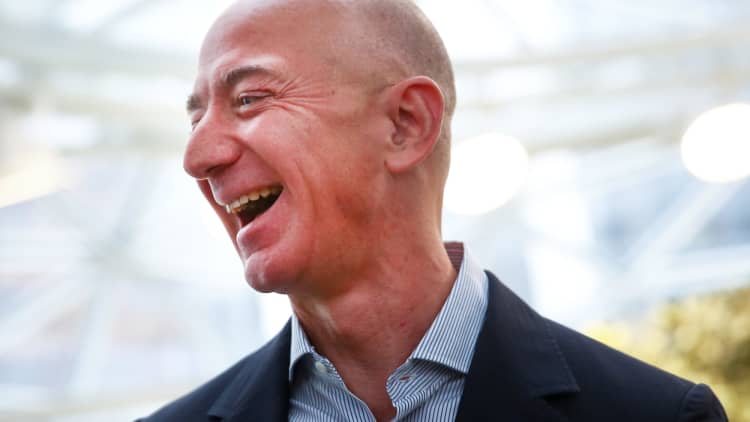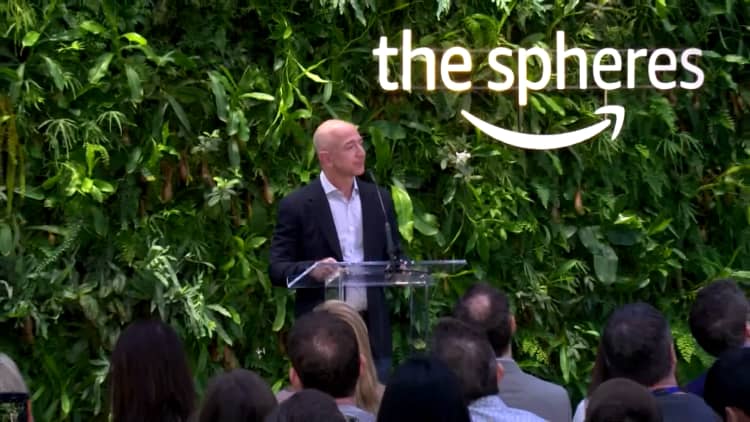
Amazon has made a lot of seemingly unrelated moves in health care over the last year.
It put together a team to figure out how to bring down the cost of pharmaceuticals for its own employees. It has 40 to 50 people to figure out how to disrupt the entire drug supply chain. It hired a senior doctor out of an innovative primary care group.
Not all of these moves made a ton of sense at the time — until Tuesday when it announced a partnership with Berkshire Hathaway and J.P. Morgan Chase to improve health care for employees of the three companies in the United States.
Details about this coalition effort are still scant, but are expected to be communicated in the coming months. But we can glean a lot by looking at what Amazon has done over the last year — and why.
Shaking up the drug supply chain
If Amazon was looking to bring down the cost of care, an obvious place to start is the multitrillion-dollar market for prescription drugs.
"For employers, drugs can be a quarter of their spend and it's the fastest-growing category from a cost perspective," said Bob Kocher, a health investor at Venrock.
So how could Amazon make a dent?
Kocher speculates that Amazon could reduce costs by accepting lower margins than pharmacy benefits managers — intermediaries that now make huge profits through sales of generic drugs in particular.
That could have a significant impact. As studies have found, more than $1 in every $5 in spending on prescription drugs goes toward profits of intermediaries in the pharmaceutical distribution system.

Moreover, given Amazon's expertise around logistics and distribution, it could think about warehousing, transporting and delivering drugs in a more cost-effective way.
Companies might also rethink — or even replace — their relationship with the pharmacy benefits managers, which negotiate prices with drug manufacturers on one end, and manage pharmacy benefits for insurers on the other. "The PBMs will do things like quality reporting for Medicare, which a company like Amazon might want to avoid," said Kocher.
"I don't think they'd want to do everything a pharmacy benefits manager does, versus a reconfiguration of the relationship," he added.
Building its own innovative health-care networks
Amazon last year met with Kaiser, Iora Health and other groups that deliver innovative primary care, CNBC previously reported. It also invested in an innovative primary care group called Qliance. And it recently hired a doctor who ran a group of Seattle-based clinics from Iora. Those now seem like smart moves if Amazon and its partners want to reap significant savings.
"Better negotiating [with hospitals and other providers] won't produce these types of savings, so owning clinics or building narrow networks may be the only way to make it work," said Stephen Buck, co-founder of Courage Health and a founder of drug discount provider GoodRx.
Health experts point to a huge body of research showing that the best way to manage costs effectively is to provide great primary care for people with chronic diseases. "If I'm an employer, I want to engage effective primary care, and that isn't easy in parts of the country," said Kocher. And by that, he means rural America where patients often have to drive for miles out of their way to see a doctor. Without access to primary care, these patients will often end up in emergency rooms with urgent concerns, which can be tens of thousands of dollars in costs for their employers.
Some companies have experimented with on-site clinics, but getting sufficient volume can be a challenge. A coalition could form its own clinics to lower costs in the long run.
Thinking big, but focusing on employer health
It's no secret that Amazon CEO Jeff Bezos has been thinking about health care since the 1990s, when he took a hands-on role at Drugstore.com. It's still top of mind.
He even has a team at Amazon called 1492 that have been thinking about disrupting the industry. And it's no surprise to many health experts that the company is focusing a lot of its attention on employer-sponsored health care, and in particular on the challenge of driving down costs without reducing the quality of care.
Most health-technology start-ups will begin there, as Kocher points out, because employers are paying a huge bill and they're not wholly satisfied with the current set of options to bring down those costs. "When you create something that can save money and improve quality, you go to employers," he said.
WATCH: Jeff Bezos tell Alexa to open Amazon's new indoor rainforest



